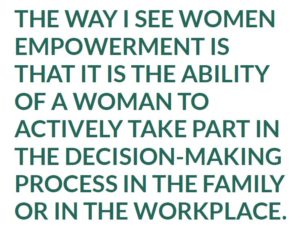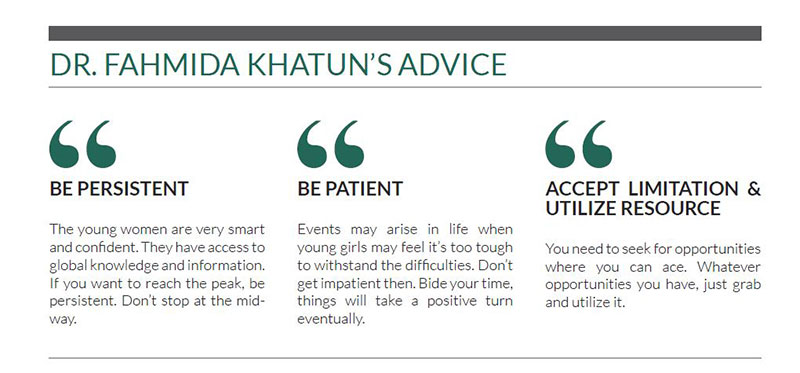Published in IDLC on Thursday, 29 March 2018
She dreamt of being a teacher since childhood. Eventually, she landed up in the realm of research and dedicated her entire professional life in giving new avenues in research for policy-making. Current, she is put at the helm of the top notch think-tank of Bangladesh, Center for Policy Dialogue (CPD). We are talking about Dr. Fahmida Khatun, Executive Director, CPD, who we had an one-to-one conversation with on the occasion of International Women’s Day. She shared her experience of growing up, professional challenges, turns of life and her thoughts about the young women in the workplace.
Dr. Fahmida Khatun
Executive Director, Center for Policy Dialogue (CPD)
MBR: Tell us a bit about your experiences growing up; your education and accomplishments which have contributed to your success as a leading think-tank of the country.
Dr. Fahmida Khatun: I grew up in an academic atmosphere where education was very important to me and to all my siblings. Since I spent my youth in a university campus, most people around me were either teachers or students. That is how I developed a knack for pursuing a career in academia.
When it was time for university admission, I was not sure about my choice of a subject. My uncle, who was a student of Economics at that time, influenced me to study Economics as he thought there would be good job opportunities for an Economics student. My first job was in a private bank where I worked for only a few months. Later, I joined Bangladesh Institute of Development Studies (BIDS). I took a study leave from BIDS for higher studies in the UK. I joined Center for Policy Dialogue (CPD) in 2002.
MBR: How has been your experience at CPD?
Dr. Fahmida Khatun: Well, I am here for more than a decade. The core mission of the organization is to give voice to the marginalized people through evidence based research and policy influencing. Therefore, we bring all the stakeholders on a single platform and facilitate debate on issues which are important for Bangladesh’s development.
The organization has grown over time, both in terms of volume of work and number of staff. We not only work on national issues, but also issues which are regionally important, such as issues related to world trade, climate change and Sustainable Development Goals (SDGs). These global issues have implications for Bangladesh. CPD is the secretariat of two important global networks, namely Southern Voice and LDC IV Monitor. We are also a founding member of the South Asia Economic Summit. In the domestic front, CPD is the secretariat of a large platform which is called the Citizen’s Platform on SDGs, which has more than 80 NGOs as members. The objective of this platform is to work on SDG implementation related activities in Bangladesh. Therefore, the sphere of CPD’s work has expanded immensely, both nationally and internationally.
MBR: What were the challenges you faced (both as an employee and a leader) and how did you overcome them?
Dr. Fahmida Khatun: There are two types of challenges – external and internal. Since we work with development policy issues, a part of our job is to scrutinize public policies that are related to Bangladesh’s development. For instance, after the national budget is announced, we review the budget and organize a media briefing to express our views. This is quite a challenging job because nobody likes to be scrutinized; nobody likes to recognize their limitations. It has always been the case that the ruling party does not like what we say, but when the same party is in opposition, they would be very appreciative of our work. This is a contradictory position on the part of the political parties. But it proves that we do not take any partisan stance; we try to influence policies and give voices to those who are voiceless. We create a platform to express opinions of broader stakeholders. However, we have to keep in mind that policies do not change immediately. It takes several years and no organization alone can influence government policies. These are the external challenges.
There are also internal challenges. CPD is a very dynamic and vibrant organization. Not only does one have to be bright and intelligent, but also have to be updated on what is happening around him or her. If one wants to excel in research and challenge the policies of the government, one’s findings have to be evidence based and one’s analysis has to be rigorous and sound. We cannot compromise with the quality. The challenge is to recruit and retain good researchers.
MBR: What does “Women Empowerment” mean to you? What sort of issues do women face in terms of taking charge or leadership in the workplace?
Dr. Fahmida Khatun:
 Even if a woman herself decides not to work, she is empowered because she can take decisions for herself. In many poor families, women are forced to work; this does not imply they are empowered. They are working and earning an income, but they are not necessarily empowered because they are not working voluntarily. They do not have the liberty to spend money on their own and they do not have the power to take decisions for their family, children, and parents.
Even if a woman herself decides not to work, she is empowered because she can take decisions for herself. In many poor families, women are forced to work; this does not imply they are empowered. They are working and earning an income, but they are not necessarily empowered because they are not working voluntarily. They do not have the liberty to spend money on their own and they do not have the power to take decisions for their family, children, and parents.
MBR: How does inclusion of women in policy making or in other professional areas in Bangladesh measure up against our neighboring countries and the west?
Dr. Fahmida Khatun: If you look around you will find that Bangladeshi women are playing important roles in the political arena. Our Prime Minister, opposition leader, Speaker of the National Parliament, and a number of ministers are women. Women are directly involved in the policy-making process. At the downstream, many women are coming to politics, which is reflected at the Union Parishad level. But we are yet to reach the expected level of gender empowerment, when compared with the advanced countries. Of course within South Asia, we are in a good position. However, we have a long way to go. Compared to the 80s, women’s participation in the labour market has increased. About 35 percent women are in the labour force in Bangladesh. Moreover, women comprise 51 percent of the total population. So what about the rest? Most of those who are in the labour market, are engaged in the informal labour market. Informal labor market comprises of those jobs which fall in the low income category and which require less skills. So their contribution to the national economy is also very low. Therefore, we need to bring more women in the formal sector with higher income.
MBR: Do you think Bangladesh shows a good result in terms of employing women in work force? Are we in a satisfactory position?
Dr. Fahmida Khatun: No, I would not say we are in a satisfactory position. Though a large the number of female university students graduate every year, we do not see all of them entering the job market. I do not think it is because employers do not want to recruit women, but because many women willingly or unwillingly do not want to join the labour market. It maybe because of their family responsibilities or because their families do not allow them to work. There are a lot of opportunities nowadays. So more girls who pass out from universities can enter the labour market and contribute to their respective families as well as to the economy.
MBR: Do you think education can play a vital role in women empowerment?
Dr. Fahmida Khatun: Definitely, education is of paramount importance to every human being as it is a tool through which one can not only acquire knowledge, but also enter into the job market. Nowadays, there are ample opportunities to be self-employed through e-commerce platform and through freelancing. The percentage of women in white collar jobs is small in our country. If you have education and the right kind of skills, then the opportunities will be open for you. So one of the reasons for women not being able to work in the formal market is the lack of education and appropriate skills.

MBR: Do you think apart from family restrictions and societal pressure, there are any barriers that are preventing women from entering into the formal sector?
Dr. Fahmida Khatun: Yes, I do. The demand of the job market is changing fast. It is a dynamic process. Gone are those days where only a certificate could suffice to get a good job. Today’s job market demands some important soft skills and IT skills. Technical skill is essential, apart from university education. A continuous improvement of one’s own skills is crucial. So one has to have continuous on the job training, and sound technical skills. The management style is also changing these days. One has to see in which direction the economy is moving. As the size of the economy has increased, the private sector has also expanded, and several multinational companies are working in Bangladesh. That means job market has also become competitive. So one has to be on top of everything. That is why with mere academic degree one cannot proceed too far. Women are lagging behind on these counts.
MBR: From the eye of a true researcher, where do you see women empowerment in Bangladesh linked with the growing economic development?
Dr. Fahmida Khatun: Women’s contribution in the economy is not reflected in the way we would like to see it. Women’s participation in the labour force at a higher rate is crucial for Bangladesh’s development. If women’s participation in the labour force increases to 48-50 percent then our GDP growth will be higher by 0.7-0.8 percent.
MBR: Any advice for the women professionals?
Dr. Fahmida Khatun: I think women nowadays are very smart. The fresh graduates are sharp and intelligent because their horizon of knowledge has expanded. Also their access to global knowledge and information has increased. So they know many things what our generation did not know at their age. They can decide from a very early age what they want to become, what subject they want to study, what profession they want to pursue, and more importantly what they like and what they do not like. But if you want to go till the end and want to achieve something substantial, you have to be persistent. Unfortunately, many women stop at the middle of their journey. Even after having the potential they cannot reach the peak. One has to be patient – withstand difficulties and be confident. One has to be utilize her talent and take advantage of the opportunities she receives. Success will be just around the corner for her.


